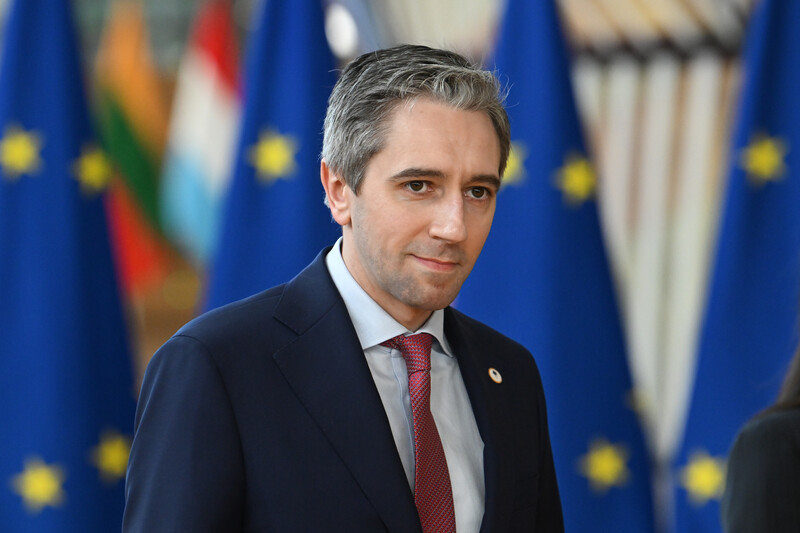Rights and Accountability 29 May 2024

Ireland’s Simon Harris does not appear brave enough to act independently of the European Union. (European Union)
Palestine’s flag was flown at Leinster House in Dublin this week.
Hoisting it at the seat of the Oireachtas – Ireland’s parliament – was apparently a “powerful” act. Or that is what Simon Harris, the taoiseach (prime minister), wanted the public to believe.
If Harris really wanted to do something powerful after recognizing a Palestinian state, he could have marched across the river Liffey toward the Morrison Hotel.
Once there, he could have noted that Israel’s Bank Leumi approved a major loan to that business in the recent past.
He could have observed that Leumi has been blacklisted by the United Nations as it funds Israel’s settlement activities in the occupied West Bank. He could have announced that no further investments will be tolerated in Ireland from Leumi or any other institution which enables or profits from crimes against Palestinians.
Harris could even have stayed on the south side of the Liffey and delivered the same message outside The Clarence. In October last – soon after the Gaza genocide began – Leumi confirmed that it was financing the refurbishment of that “iconic” hotel.
Two of its previous owners – Bono and The Edge from the rock band U2 – benefited handsomely from the deal, the importance of which stretched beyond the suites and bar at The Clarence.
The current owners – Matt Ryan and Paddy McKillen Jnr. – run a firm named Press Up. A dominant player in Dublin’s restaurant and entertainment scene, its portfolio includes the Workmans Club, one of the city’s best known music venues, and the Stella, a popular cinema.
The Leumi loan is being used to build an extension at The Clarence. That means Press Up is expanding with “generous” support from a war crimes enabler.
Second billing
The Palestinian flag erected at Leinster House has second billing to the flag of the European Union.
That fact seems to be lost on the commentariat, even though it is significant in both a symbolic and practical sense: Palestinians have always been given second billing (if not lower) by the European Union.
Two EU governments – Spain and Ireland – may have recognized a Palestinian state this week. Collectively, the EU remains a staunch ally of Israel, while it commits a genocide.
That was emphasized by Olivér Várhelyi, a member of the European Commission, as he undertook his latest trip to the Middle East. He kicked it off by calling to see his buddy Israel Katz, Israel’s foreign minister, and subsequently hung out with Isaac Herzog, the president, and Yoav Gallant, the defense minister.
All three men were named in the late January interim ruling from the International Court of Justice, which ordered Israel to cease killing Palestinians in Gaza.South Africa, the country suing Israel at the ICJ, argued that the three displayed genocidal intent through comments warning or announcing that Gaza’s civilians would not be spared. Just last week, Karim Khan, the chief prosecutor at the International Criminal Court, requested a warrant for Gallant’s arrest.
Theoretically above national politics, Olivér Várhelyi is, to all intents and purposes, Hungary’s point man in Brussels. He effectively represents the state that will assume the EU’s rotating presidency in just over a month’s time.
He is displaying solidarity with Israel mere days after it slaughtered families cowering in Rafah’s tents.
So far the EU has refused to hold Israel in any way accountable for the Gaza genocide.
Monday’s decision by the bloc’s foreign ministers to convene a meeting with Israel about its human rights abuses may be a step in the right direction. But it would not be surprising if several EU countries block any concrete measures.
Fortunately, the Palestinian and EU flags at Leinster House are too high for Simon Harris to reach. He must never be allowed to hide behind either flag, while seeking excuses for the cowardice of official Ireland.
It must never be forgotten that Harris leads Fine Gael, a party which has vetoed a ban on imports from Israel’s settlements in the West Bank. Even though that ban has won majority backing from both houses in the Oireachtas, Fine Gael has maintained that Ireland’s hands are completely tied by the EU (something that is untrue).
As a new taoiseach, Simon Harris could do something powerful by proving that Ireland is willing to impose far-reaching trade sanctions on Israel even if his masters in Brussels object.
It would be braver if Ireland would be the first to do so but that is not strictly necessary.
Ireland, Spain and, to a slightly lesser degree, Belgium have been more outspoken on Gaza than other EU states. There is nothing to stop those three countries from jointly introducing a package of sanctions against Israel.
Until Ireland takes real action, its gestures will have about as much substance as the wind that makes the flags at Leinster House flutter.





